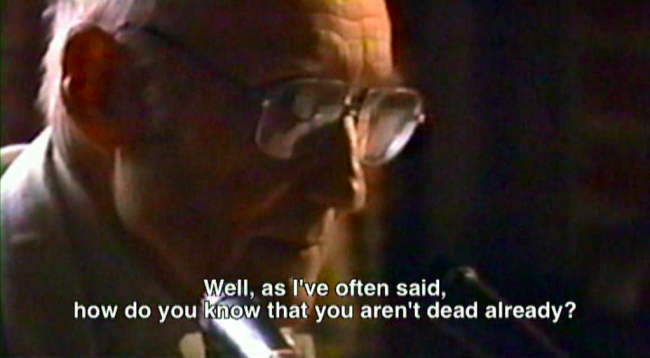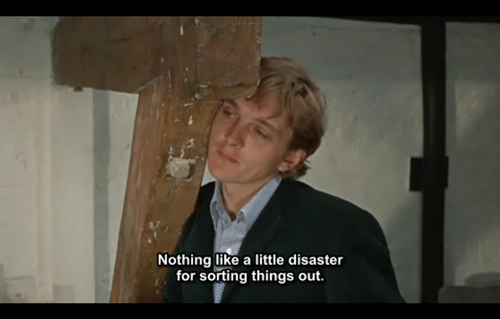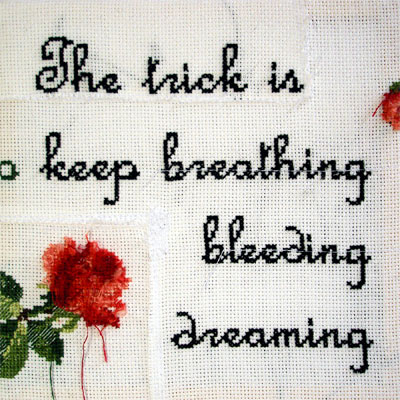
Gene Youngblood, Expanded Cinema, 1970

Gene Youngblood, Expanded Cinema, 1970
Mirrors should reflect a little before throwing back images.
– Jean Cocteau

“What Bill [William S. Burroughs] explained to me then was pivotal to the unfolding of my life and art: Everything is recorded. If it is recorded, then it can be edited. If it can be edited then the order, sense, meaning and direction are as arbitrary and personal as the agenda and/or person editing. This is magick. For if we have the ability and/or choice of how things unfold—regardless of the original order and/or intention that they are recorded in—then we have control over the eventual unfolding. If reality consists of a series of parallel recordings that usually go unchallenged, then reality only remains stable and predictable until it is challenged and/or the recordings are altered, or their order challenged. These concepts led us to the realization of cut-ups as a magical process.”
– Genesis Breyer P-Orridge (Thee Psychick Bible)
[via]
As artists, curators, and writers, we are increasingly forced to market ourselves by developing a consistent product, a concise presentation, a statement that can be communicated in thirty seconds or less—and oftentimes this alone passes for professionalism. For emerging artists and curators there is an ever-increasing number of well-intentioned programs that essentially indoctrinate them into becoming content providers for an art system whose values and welfare are wholly defined by its own logic of supply and demand.
Anton Vidokle, Art without Market, Art without Education: Political Economy of Art, 2013
“There is an aesthetic crisis in writing, which is this: how do we write emotionally of scenes involving computers? How do we make concrete, or at least reconstructable in the minds of our readers, the terrible, true passions that cross telephony lines? Right now my field must tackle describing a world where falling in love, going to war and filling out tax forms looks the same; it looks like typing.”
[via dayofthedreamweavers]
“Anti-art is art because it has entered into a dialectical dialogue with art, re-exposing contradictions that art has tried to conceal. To think that anti-art raises everything to the level of art is quite wrong. Anti-art exists only within the boundaries of art. Outside these boundaries it exists not as anti-art but as madness, bottle-racks and urinals”
(SMILE Magazine, 1985; quoted by Florian Cramer, in Anti-Media, 2013)

Blow Up, Michelangelo Antonioni, 1966
“We can argue about whether the loss of a cultural center is a good thing or not, but it really doesn’t matter what one generation believes is good for the next… all of our choices are leading in just one direction, which is away from the center.”
Seth Godin, We Are All Weird
You are always looking for an emotion that has already been felt, just as you like to get an old pair of trousers back from the cleaners, which seem new as long as you don’t look too close. Artists are cleaners, don’t be taken in by them. The real modern works of art are not made by artists, but quite simply by men.
Francis Picabia, in Jesus Christ Rastaquouère (1920)

Giusto un piccolo reminder…

L’inferno dei viventi non è qualcosa che sarà; se ce n’è uno, è quello che è già qui, l’inferno che abitiamo tutti i giorni, che formiamo stando insieme. Due modi ci sono per non soffrirne. Il primo riesce facile a molti: accettare l’inferno e diventarne parte fino al punto di non vederlo più. Il secondo è rischioso ed esige attenzione e apprendimento continui: cercare e saper riconoscere chi e cosa, in mezzo all’inferno, non è inferno, e farlo durare, e dargli spazio.
(Italo Calvino, Le città invisibili, 1972)
Calvino moriva il 19 settembre del 1985 a Siena. Vent’anni fa.
“Roma è deleteria per qualsiasi artista. Poeti, narratori, pittori e registi di cinema si adagiano sul ‘ce pensa Roma’. Quando non si sa come risolvere una scena, quando fantasia e visione sono momentaneamente prosciugate, è presto fatto: si allarga l’inquadratura e si rimedia una veduta di Roma. Ci si toglie d’impaccio affidandosi al paesaggio, che qui è sempre meraviglioso. Roma non fa mai la stupida nei romanzi e nei film, nei quadri, nelle poesie: dà sempre una mano agli artisti a far dir di sì all’opera d’arte. Ce pensa Roma, questa Supercity che arriva in soccorso dei suoi abitanti, a sventare catastrofi, come un Superman dello spirito. Quando sei a Roma ti basta uscire a fare una passeggiata e ogni dramma interiore è risolto, pensa a tutto lei, non occorre che ci aggiungi niente di tuo.” (TIZIANO SCARPA)
Dal libro Errore di Sistema, appena uscito per Feltrinelli.
“I videogame non influenzano i bambini: infatti se da piccoli fossimo stati plagiati da Pac-Man, adesso passeremmo il nostro tempo libero in ambienti semibui, mangiando pillole magiche e ascoltando musica elettronica ripetitiva”. (Kristian Wilson, Nintendo Inc., 1989)
Nei giorni scorsi ho scritto poco, ma ho letto molto. E questa è una delle cose che ho letto:
“La vita moderna è complessa e relativa; sono queste le due note che la distinguono. Per rendere la prima occorre l’atmosfera con la sua delicateza di nuances, di suggestioni, di prospettive insolite; per la seconda si richiede lo sfondo. Ecco perchè la scultura ha cessato di essere un’arte rappresentativa, e perchè la musica è un’arte rappresentativa, e perchè la letteratura è, è stata, e sarà sempre, la suprema arte rappresentativa.”
(Oscar Wilde, De Profundis, 1897)
Sto leggendo un libro molto interessante che si chiama Design & Crime, di Hal Foster. Inizia citando Edward Said: “Che cos’è in fondo la coscienza critica se non un’inarrestabile predilezione per le alternative?”